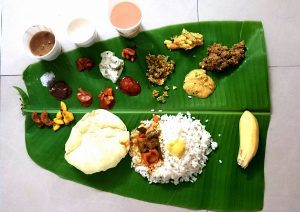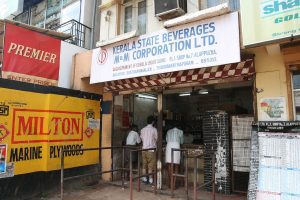Kerala will become the first state to officially suggest a diet plan that will be healthy and help combat lifestyle diseases.

A typical thattu kada, or roadside eatery, in Kerala. (Creative Commons)
Kerala is all set to introduce diet plans for its people in a bid to check the alarming rise in lifestyle diseases such as diabetes and heart diseases, among others.
If everything goes according to schedule, it would become the first state in the country to officially suggest a diet plan that encourages a change in popular food consumption patterns to fight such ailments.
“Age-specific and disease-specific diet plans have been prepared,” said Dr Bipin K Gopal, state nodal officer, National Programme for Prevention and Control of Cancer, Diabetics, Cardiovascular Diseases and Stroke.
Drawn up by 82 dieticians from within and outside the state, the plans will be made public through government health centres. “These are the first point of contact for those wanting healthcare,” Dr Gopal said.
While the finer points of the diet plan are not yet known, South First learns that the underlying message would be for everyone to avoid unhealthy carbohydrate foods such as potatoes, and give importance to healthy carbohydrates from vegetables, fruits, whole grains, etc.
The programme has drawn inspiration from the EAT-Lancet Commission — consisting of 37 leading scientists from 16 countries from various scientific disciplines — which has developed the world’s first scientific targets for healthy and sustainable food systems.
Incidentally, these targets include a “planetary health diet” that defines daily consumption ranges for each food group — based on which the Kerala initiative has prepared its own planetary health diet.
A dietician who was part of the current initiative told South First on condition of anonymity that a customised planetary diet plan has been prepared with high-quality plant-based foods and low amounts of animal-based foods, refined grains, added sugars, and unhealthy fats.

With the state having a largely rice-eating population, drawing up a common diet plan was relatively easy. (Creative Commons)
The plan has tried to accommodate local and individual situations, traditions, and dietary preferences, the dietician said.
Meanwhile, sources said that the state government initiative will be finalised once the ongoing population-based screening for lifestyle diseases among the 30+ age group, which is in progress in the state, comes out with its findings.
According to Dr Sreejith N Kumar, a diabetologist and former state president of the Indian Medical Association (IMA), introducing a diet plan for the population is not at all difficult in a state like Kerala.
“There might be some differences between the coastal belt and hilly areas, but by and large, rice is the first choice of food being consumed, which is rich in carbohydrates,” said Dr Kumar. “So, a diet plan could easily be introduced.”
The seeds of the diet programme were first sown by the IMA’s Kerala branch in 2015, when it floated a state-level plan for ensuring safe and healthy food.
Here, it suggested a reduction in carbohydrate-rich food like rice and wheat; rice yields approximately 70 percent and wheat yields approximately 60 percent of carbohydrates. Any excess carbohydrate is converted to fat by the liver and is stored within itself or as visceral fat primarily in the anterior abdominal wall.
While highlighting that “food has killed more people than famine”, it is also recommended that foods high on fat, salt and sugar be avoided.
The decisive moment in Kerala’s fight against lifestyle diseases came in 2016 when the then state finance minister Thomas Isaac introduced the “fat tax” in the 2016-17 Budget.
He then said that the tax, at 14.5 percent, was more of a preventive measure as the state’s food habits were changing dramatically as people were increasingly preferring junk foods over traditional foods.
Then came the study by the Achutha Menon Centre for Health Science Studies (AMCHSS), a public health training centre that functions under the Sree Chitra Tirunal Institute for Medical Sciences and Technology, in 2017.
The study, titled ‘Prevention and Control of Non-Communicable Diseases in Kerala’, was a first of its kind pan-Kerala study that tried to check the NCD burden among the population.
The study had stressed the need for promoting a diversified, balanced and healthy diet among the state’s population. It highlighted that individual preferences and beliefs, cultural traditions, as well as geographical, environmental, social, and economic factors — all of these interact in a complex manner to shape individual dietary patterns.
Health officials said all these factors contributed to the idea of chalking out a diet plan in 2019, which has now neared completion.
Scattered studies have pointed to an alarming trend in Kerala: more and more people are suffering from various lifestyle diseases including diabetes, blood pressure, heart diseases, stroke, kidney disease, and cancer.
The 2017 study by the AMCHSS found:
The findings of the National Family Health Survey (2019-21) have not painted a rosy picture for Kerala either.

A Beverages Corporation outlet. Alcohol consumption is also a reason for increased lifestyle diseases. (Creative Commons)
For instance, it says, 18 percent of men and 12 percent of women respondents to the survey in Kerala had hypertension.
Meanwhile, the screening for NCDs, or lifestyle diseases, among the 30+ age group that was launched on 7 December, 2021, has covered 21.68 lakh people till Tuesday, 20 September. The preliminary data is alarming:
Those referred for screening:
Some people also got referred for tuberculosis screening and respiratory evaluation, among others.
Dr Harikrishnan S, professor in cardiology at the Sree Chitra Tirunal Institute for Medical Sciences and Technology, said students in the schools and colleges too should be encouraged to address the challenge posed by lifestyle diseases.
“It’s said prevention is better than cure. In the case of NCDs, the state should also target the young generation by making them aware of the importance of following a healthy diet and lifestyle,” said Harikrishnan.
“Interventions through health clubs at schools and colleges and creating awareness through curriculum could also be prioritised.”
Meanwhile, sources said the government has planned to initiate awareness programmes at the workplace as well as among school/college students.
It will also seek to eliminate trans-fat from food items in restaurants, sweet shops, bakeries, etc. This will be implemented with the help of the Commissionerate of Food Safety, a body entrusted with implementing the Food Safety and Standards Act 2006.
The programmes will be brought under one umbrella — the “Healthy Life Campaign”, a mass campaign targeting people from all strata of society.
The campaign will be implemented with the help of local bodies, various clubs and associations, trade unions, and the women empowerment initiative Kudumbashree.

Apr 19, 2024

Apr 19, 2024

Apr 19, 2024

Apr 19, 2024

Apr 19, 2024